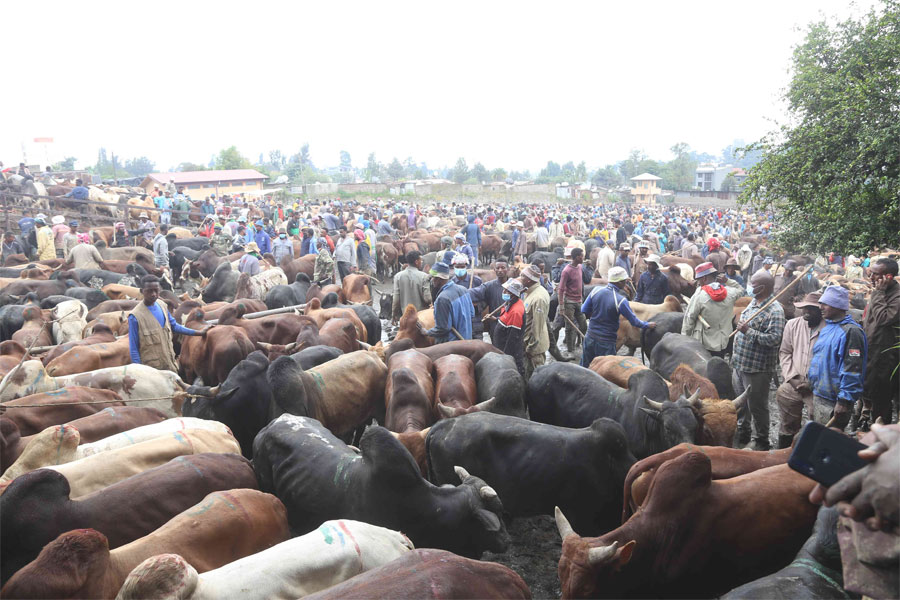
Fortune News | Jun 13,2025
Jun 25 , 2022
By Asseged G. Medhin
Regardless of the outcome to any nation, they cannot be thinking of risk and finance the same way following the global financial crisis. Directly or indirectly, all countries have been affected. Ever since the global financial crisis, companies worldwide have changed their focus on risk management. This process has been accelerated by COVID-19, war and geopolitical events. Today, what was once a concern primarily of senior executives in the financial services sector has now become a top-management priority in nearly every industry.
Financial leaders, governors and CEOs are devoting much of their time and resources to financial management. Their focus is on the risk-managing function of the formal financial system that reallocates resources from savers to investors; monitors corporate control; facilitates trading, hedging, and diversifying; and balances financial development against stability.
Regulators' and policymakers' priorities are also changing. Financial risk is becoming a new phenomenon that the dynamics continue to evolve. No one expert can teach us how to control financial risks using past models as they have been challenged globally and a new approach is needed to improve the financial infrastructure to heighten confidence in financial institutions.
To build a data collection framework for better monitoring, and devise financial tools suited to help role makers address risk, management knowledge is crucial, without which no institute can absorb the type of shocks we are observing now. In our case, all macro and micro variables aggravate financial institutions’ liquidity risk. It has become challenging to mitigate inflation and the impact of risk associated with it.
Unless effectively regulated and controlled using the models, financial shocks will not only affect the institution but also transform the risk from one organisation into a systemic risk. We also need to assess existing polices, overall risk and challenges to adopt new policies that will foster financial stability through macro policy, select the right indicators of systemic risk, focus on crisis preparedness, and reduce regulatory uncertainty.
There should be a conscious approach and a wide-ranging package of financial risk management. Prudent financial inclusion, for instance, can enhance financial stability, but stability can be endangered when inclusion is uncontrolled. In our case, regulation is there but challenges and financial infrastructural problems are detrimental, a problem that will continue to persist until the latter meets the former.
Financial risk management is essential in today’s volatile economy. There must be readiness to mitigate challenges in the financial system, the market, liquidity, operational and legal risks. The same goes for stress testing whether the system is permeable to poor execution, flaws and monitoring. To do as such, there should be an extensive knowledge and global understanding of rampant financial risks, to which we are not an exception.
Regulators, policymakers and experts in the area should pursue a highly technical approach to financial risk management, especially for a financial sector which involves complex financial models. Sooner or later, Ethiopia will open its financial sector to foreign investors. Local bankers and insurers will be significantly challenged by the most extraordinary financial risk models augmented with advanced bank products and insurance policies. To compete and remain ahead, they need to troubleshoot existing problems and organisational culture.
We need a new approach. We should stop thinking of financial risk management as primarily a regulatory issue and re-conceive financial risk management as a value-creating activity that is an essential component of the strategic debate inside a company. The goal of that discussion should not be to eliminate financial risk but to use it to create a competitive advantage. Doing that effectively depends upon a far more dynamic interaction between and among all stakeholders of financial risk management experts and the financial institutions across the country.
PUBLISHED ON
Jun 25,2022 [ VOL
23 , NO
1156]


Fortune News | Jun 13,2025

Radar | Nov 14,2020

Fortune News | May 27,2023

Fortune News | Jun 03,2023

Radar | Apr 08,2023

Fortune News | Dec 09,2023

Fortune News | Dec 10,2022

Fortune News | Sep 22,2024

Radar | Jun 18,2022


Photo Gallery | 174592 Views | May 06,2019

Photo Gallery | 164819 Views | Apr 26,2019

Photo Gallery | 155015 Views | Oct 06,2021

My Opinion | 136695 Views | Aug 14,2021
Editorial | Oct 11,2025

Dec 22 , 2024 . By TIZITA SHEWAFERAW
Charged with transforming colossal state-owned enterprises into modern and competitiv...

Aug 18 , 2024 . By AKSAH ITALO
Although predictable Yonas Zerihun's job in the ride-hailing service is not immune to...

Jul 28 , 2024 . By TIZITA SHEWAFERAW
Unhabitual, perhaps too many, Samuel Gebreyohannes, 38, used to occasionally enjoy a couple of beers at breakfast. However, he recently swit...

Jul 13 , 2024 . By AKSAH ITALO
Investors who rely on tractors, trucks, and field vehicles for commuting, transporting commodities, and f...

Oct 11 , 2025
Ladislas Farago, a roving Associated Press (AP) correspondent, arrived in Ethiopia in...

Oct 4 , 2025
Eyob Tekalegn (PhD) had been in the Governor's chair for only weeks when, on Septembe...

Sep 27 , 2025
Four years into an experiment with “shock therapy” in education, the national moo...

Sep 20 , 2025
Getachew Reda's return to the national stage was always going to stir attention. Once...

Oct 12 , 2025
Tomato prices in Addis Abeba have surged to unprecedented levels, with retail stands charging between 85 Br and 140 Br a kilo, nearly triple...

Oct 12 , 2025 . By BEZAWIT HULUAGER
A sweeping change in the vehicle licensing system has tilted the scales in favour of electric vehicle (EV...

A simmering dispute between the legal profession and the federal government is nearing a breaking point,...

Oct 12 , 2025 . By NAHOM AYELE
A violent storm that ripped through the flower belt of Bishoftu (Debreziet), 45Km east of the capital, in...